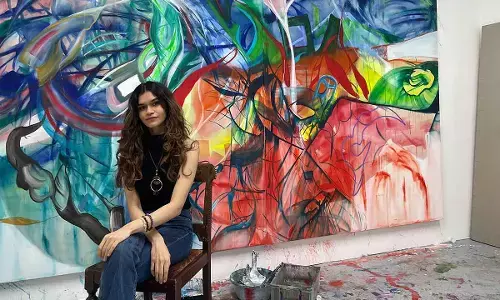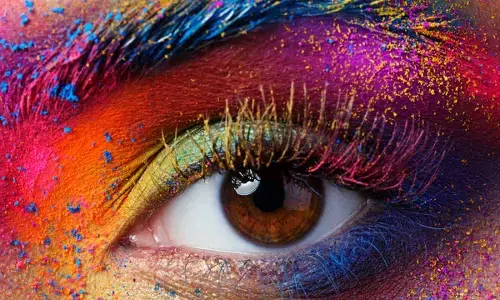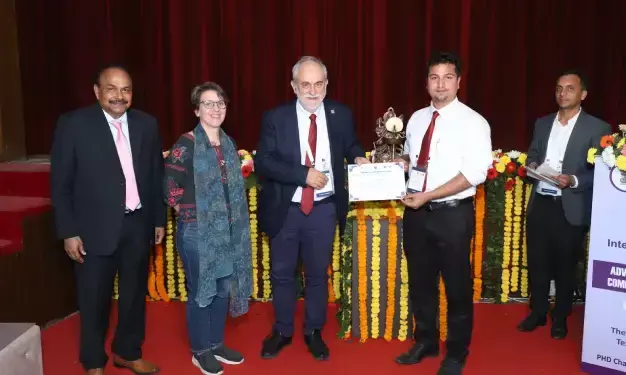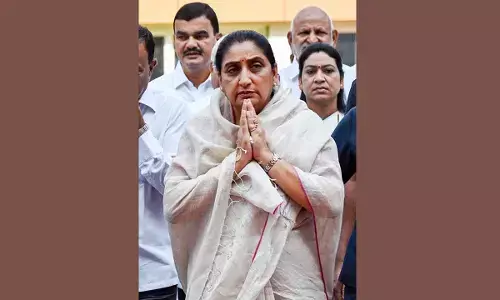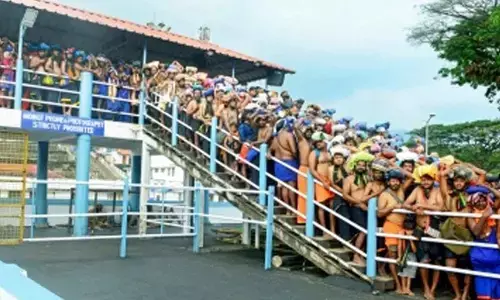The ever fragrant Malathi

Ideal people are found in small numbers only. One has to seek destiny through insight. From being a passive member of a mob, one has to be different…different from others. The thoughts, the words and the deeds have to be positive and different from the routine. Knowing one’s self helps to make the individual a better human being...” wrote Malathi Chandur while replying to a question posed by a reader of a magazine. It seems like she had practically applied this theory in her life before passing on the advice. As a columnist, radio artiste, counsellor, cook-book writer, novelist and social worker, she had touched Telugu people’s lives in numerous ways until she breathed her last on August 21 at Chennai. And she continues to rule hearts through her many writings
Malathi Chandur arrived in a big way with ‘Pramadaavanam’, a weekly column published by Andhra Prabha that helped many women voice their problems and seek counselling. Her book, ‘Hrudaya Netri’ won the Sahitya Akademi Award and her cookery book ‘Vantalu Pindivantalu’ was reprinted at least 30 times
Dr PS Gopalakrishna
 “Ideal people are found in small numbers only.. One has to seek destiny through insight. From being a passive member of a mob, one has to be different…different from others. The thoughts, the words and the deeds have to be positive and different from the routine. Knowing one’s self helps to make the individual a better human being…” wrote Malathi Chandur while replying to a question posed by a reader of a magazine. It was one among the thousands of replies she gave through her columns, prominent among them being ‘Pramadaavanam’ which was published for a record period of 40 years plus (in Andhra Prabha weekly). Her answers covered many subjects and showed her erudition, despite the fact that her formal education was limited and that she privately completed her Secondary School Leaving Certificate (popularly known as SSLC in those days, equivalent to the present day first year Intermediate).
“Ideal people are found in small numbers only.. One has to seek destiny through insight. From being a passive member of a mob, one has to be different…different from others. The thoughts, the words and the deeds have to be positive and different from the routine. Knowing one’s self helps to make the individual a better human being…” wrote Malathi Chandur while replying to a question posed by a reader of a magazine. It was one among the thousands of replies she gave through her columns, prominent among them being ‘Pramadaavanam’ which was published for a record period of 40 years plus (in Andhra Prabha weekly). Her answers covered many subjects and showed her erudition, despite the fact that her formal education was limited and that she privately completed her Secondary School Leaving Certificate (popularly known as SSLC in those days, equivalent to the present day first year Intermediate).
Malathi was the sixth and youngest child of her parents Jnaanaamba and Venkateswarlu. She was born in 1930 at Nuzivid in Krishna District. Their house was in Kothapet, opposite a banyan tree. Malathi and her siblings used to play under the tree. She studied up to the Class VIII at the local SSR school. Even as a child, she was fond of reading. She used to actively participate in extra-curricular activities at school. She used to sing at the health week celebrations. She could remember some of those songs even in her twilight years. One of the songs was “Domale mana satruvulu” (the mosquitoes are our enemies)!
She was sent to Eloor, to her maternal uncle Chandur Nageswara Rao (popularly known as NR Chandur), to pursue her high school education. It proved to be a turning point in their lives, more appropriately, their life! Nageswara Rao (Chandur from now on) and Malathi reached Madras in 1947 and by the end of the year got their marriage registered. Theirs was reported to be the first registered marriage at Madras post-Independence. Chandur, who by then was a writer of considerable standing, encouraged her to study further. Malathi appeared for the SSLC privately and passed. They initially stayed at George Town from where they moved on to Purasawalkam. The Chandurs were attracted to the All India Radio station at Egmore. AIR, Madras of those days was the focal point of the cultural heritage of the Telugu people of the Presidency. Recollecting those golden days Malathi once wrote: “I used to see Viswanatha Satyanarayana, Krishna Sastry, Gopichand, Narla, Padmaraju, Rajamannar and other stalwarts at the radio station. The seats where they sat were also venerated by youngsters like me! “
It was AIR Madras which encouraged Malathi, the budding writer. However, her first broadcast was through a play, written by Munimanikyam Narasimha Rao. She played a small role in the play and said a tiny dialogue: ‘Akkaa...baavocchaadu’(Elder sister! The brother-in –law has come)! Her first talk was reported to be on Tolstoy. Over the time, she became a seasoned broadcaster, writing stories, talks etc for radio. She also started participating in discussions. Her flair for handling drama was noticed by the authorities at the radio station and she was encouraged to write plays for the radio. Perhaps, she wrote all her plays for radio only. She continued to write plays for radio long after Chandur stopped writing plays (I once persuaded Chandur to write plays again for AIR in 1988; he gave me some synopses but the plays never materialised. Of course, I had the privilege of producing Malathi’s plays for radio).
Malathi started contributing stories to noted periodicals of the day. Her first story was ‘Ravvala duddulu’ (Diamond ear rings) published in ‘Anandavani’. Some of her earlier stories were published in the monthly ‘Bharati’, a recognition yearned for by Telugu writers in those days. She was seen as a writer of promise but there were a few who attributed all of it to Chandur.
Malathi Chandur arrived in a big way with ‘Pramadaavanam’, a weekly column, published by Andhra Prabha. The column became very popular. Initially the column was seen as a novelty which would not long last. It sustained for a few decades. Successive editors of the magazine chose to continue the column, based on its popularity. The column helped many women voice their problems and seek counselling. In some cases the correspondents were simply denoted as ‘a sister’, to help protect the privacy of the readers. As in the past, all which appeared in ‘Pramadaavanam’ was also attributed to Chandur. It could be that Malathi consulted her husband and was guided by him, in the early days. It is very uncharitable to deny Malathi her due place. She was a voracious reader. She had a great and insatiable thirst for books, a habit that continued till her very end. She put her reading to good use by sharing her knowledge. Once a reader found fault with her for concentrating more on domestic issues and cookery without caring for the development of women, may be due to concerns of circulation. Malathi replied that she was not concerned with the circulation of the magazine, for her prime aim was to be helpful to Telugu women in their daily lives; she added that ninety percent of women give prime importance to their homes and families. It was also her wish to help women improve their latent creative abilities, by providing information. She added that she was thanked by many readers for providing extensive and useful guidance in preparing ‘aavakaaya’ (mango pickle). Her cookery book ‘Vantalu Pindivantalu’ had been printed for about 30 times vindicating her point of view. Some cookery experts keep referring to ‘Malathi Chandur kaakarakaaya podi (Malathi Chandur bitter-gourd powder)! Malathi had a huge fan-following. Some grateful readers named their girls ‘Malathi Chandur”, retaining even her family name. Mahila mandals were named after her. The Chandur’s residence in Santhome used to have regular visitors, some of them on pilgrimage to Tirupati.
Malathi introduced literary classics of the world through her ‘Paatha kerataalu’ (Old waves) and ‘Kottha kerataalu’ (New waves). She was also a successful translator. She was made a member of the Film Censor Board at Chennai in the 1970s.To comprehend Tamil films better, she stated learning the language. Her proficiency in Tamil combined with her creative ability made her a successful translator. She translated many literary works from Tamil to Telugu. Her translations included the works of the legendary Pudumaippitthan, Jayakanthan, Sivasankari, Sujatha (Rangarajan) and M Karunanidhi (Former Chief Minister of Tamil Nadu).
Malathi Chandur was also a successful novelist. Like her short stories, her novels were also woven around middle class life. Her first novel ‘Champakam Cheda Purugulu’ (Champakam and white ants) depicted the life of a middle class working girl, whose parents never allowed her to marry, with an eye on her income. Her ‘Sataabdi Sooreedu’ traced the life of three generations of women. Her Sahitya Akademi award winning novel ‘Hrudayanetri’ had the freedom struggle as its backdrop. She wrote many novels; ‘Aalochinchu’, ‘Enni metlekkina’, ‘Sisira Vasantham’, ‘Kalala Velugu’, ‘Bhoomiputri’, ‘Manasuloni Manasu’, and ‘Vaisaakhi’ are some of her popular novels. It would appear that she never indulged in complicating themes; but her novels concerned themselves with life around. Most of her women characters appear to be individualistic and capable of independent thinking. She never lost an opportunity to imbibe positive attitude in her novels. In her novel ‘Aalochinchu’,a character seeks another to think: ” Think… Try to find the reason for everything. There would be a reason for every act. There would be causes for every pain and anguish. We try to find out the causes for our physical illnesses. Likewise, we should find out the causes and origins of our mental agonies. That is why I want you to think…”
Malathi was very much concerned about the exploitation of the downtrodden women, especially those of rural India. She opined that writing could only help to create awareness in the literate populace and to inspire the rural women; the activist-writer should live amongst them. She was worried about the ever-increasing media and cautioned against increasing indiscipline. She suggested proper use of education, discretion and good sense in handling present day life.
Malathi was a recipient of many awards and honours. Apart from the Sahitya Akademi award, she got the prestigious Bharatiya Bhasha Parishad award (1990), the Raja-Lakshmi literary award (1996) and the Telugu University awards. She and Chandur received the first Lok Nayak Foundation award instituted by Dr Yarlagadda Lakshmiprasad, in 2005. She was conferred with honourary doctorate by Sri Padmavathi Mahila Visvavidyalayam,Tirupati. Chandur passed away in January 2011. Malathi took the loss in her stride. She, however, did not want to edit his brainchild ‘Jagathi’, a unique monthly.” I cannot do it the way he did. I don’t want to mishandle it and spoil his legacy,” she said.
On a very personal note, I have known the Chandurs for over 40 years. They were very warm, caring and humane. Twenty years ago, I was struck by two tragedies in a row. The Chandurs came to my residence to console me and counsel me. Later they used to call me to know my welfare. I had many occasions to meet and interact with them officially at All India Radio, Madras. Their range and humility were exemplary. When our dear poet-laureate Dasarathi passed away, I wanted Malathigaru to come to the Radio Station to record her tribute. After the recording was over, she asked me whether AIR would broadcast tributes to her on her demise. Yes, Malathigaaru, AIR did broadcast a tribute programme on your demise.
Malathi had a pragmatic outlook of life. She showed it by willing to give her body to the Sri Ramachandra Medical Centre, Chennai. She remained active till she passed away on 21 August at Chennai due to cancer. She was the Chairperson of the Amarajeevi Potti Sreeramulu Memorial Trust, Chennai and was associated with Andhra Mahila Sabha, Chennai.
(The writer is the former director of All India Radio)





